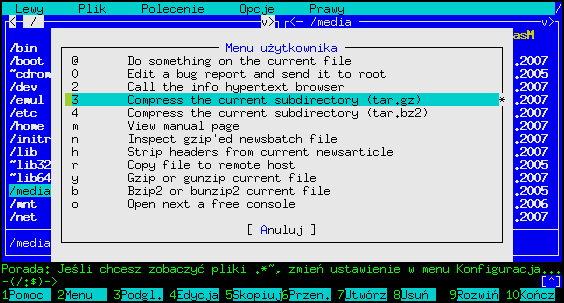New version of sptrace was released today. Sptrace is a secure ptrace() Linux Kernel Module (LKM). It limits users’ access to the ptrace() call. Module was updated to reflect changes in new kernel releases and tested with 2.6.26.
Category: English
Keep Doxyfile in sync with Autoconf
Generating Doxygen configuration file – Doxyfile from Autoconf is simple and helps to avoid duplication of version numbers, input and output directories and packages names. Doxyfile can be generated like Makefiles from Doxyfile.in by configure script.
ClamFS 1.0.0 has been released
Multiple FreeBSD jails sharing one IP address
If you want to use multiple jails on FreeBSD with only one external IP addresses you may set up all jails on private addressed with little help of loopback interface, NAT and PF.
Continue reading “Multiple FreeBSD jails sharing one IP address”
Source code (security) auditing utilities available in Debian
Debian GNU/Linux provides several packages that can be used to audit C/C++ source code. First three search for programming errors that might lead to potential security flaws:
Next two tools find bugs in C and C++ source code by doing a static check too, but their checks are not security-related:
OpenWRT meets OpenDNS
To make whole home network use OpenDNS I need to change only 3 files on my OpenWRT router.
First step – resolv.conf
Create /etc/resolv.conf.opendns with OpenDNS servers addresses, eg:
nameserver 208.67.220.220
Make sure /etc/resolv.conf defines 127.0.0.1 as a name server.
Second step – dnsmasq
In /etc/config/dhcp set resolvfile variable:
Restart dnsmasq with:
# /etc/init.d/dnsmasq restart
How to build RPM packages in CentOS chroot on… Debian!
Debian GNU/Linux has its sbuild and (much easier) pbuilder, but can you imagine that Debian includes software to create RPM-based chroots and build RPM packages under them?! Package called mach provides tool similar to pbuilder. It create chroots, manage them and allow user to create RPMs in separated, clear and reproducible environment. Just like packages should be build. Moreover its as easy to use as pbuilder is (if not even easier).
Continue reading “How to build RPM packages in CentOS chroot on… Debian!”
ESE Key Daemon 1.2.4 released
New version of ESE Key Daemon was released today.
Release notes:
- Fixed cross-compilation bug reported by hartleys.
- Removed debian directory (will try to include esekeyd in Debian).
- Removed old directory (Linux 2.4 users can use 1.2.3, but 2.4 support is no longer maintained).
- Removed lib directory (any modern (g)libc has getopt).
Download: esekeyd-1.2.4.tar.gz (.asc)
MD5: 5eb8d1b02cdd99d0681e946768e529db
SHA1: 12395b670dbf9ae93573e9cd5f57c51c3572a8aa
Web browser anonymity threats
Anonymity in important for many people. Few years ago, it was problematic issue only for hackers, human rights workers and anonymity freaks. They want to keep they identity in secret for obvious reasons. They were traced only by law enforcement agencies and government. Today everything is much more difficult. Hundreds of advertising agencies trying to reveal identity of people to target their commercials better.
Web browser can give them so many information. For example in which languages you speak (browser shares your language preferences with sites you visit)., in which city you live (this can be obtained from IP), how big is your computer display (web page can get your display resolution), what video player or office suite you have installed (they can query installed browser plugins) and much more...
How to mount file systems easily in Midnight Commander
Everyone know Midnight Commander default user menu (invoked with <F2> key). It contains some (more or less) useful commands and it is… customizable.

If you want to use different menu for some directory you just need to create file .mc.menu in target directory. I made a simple menu form /media/.
Continue reading “How to mount file systems easily in Midnight Commander”